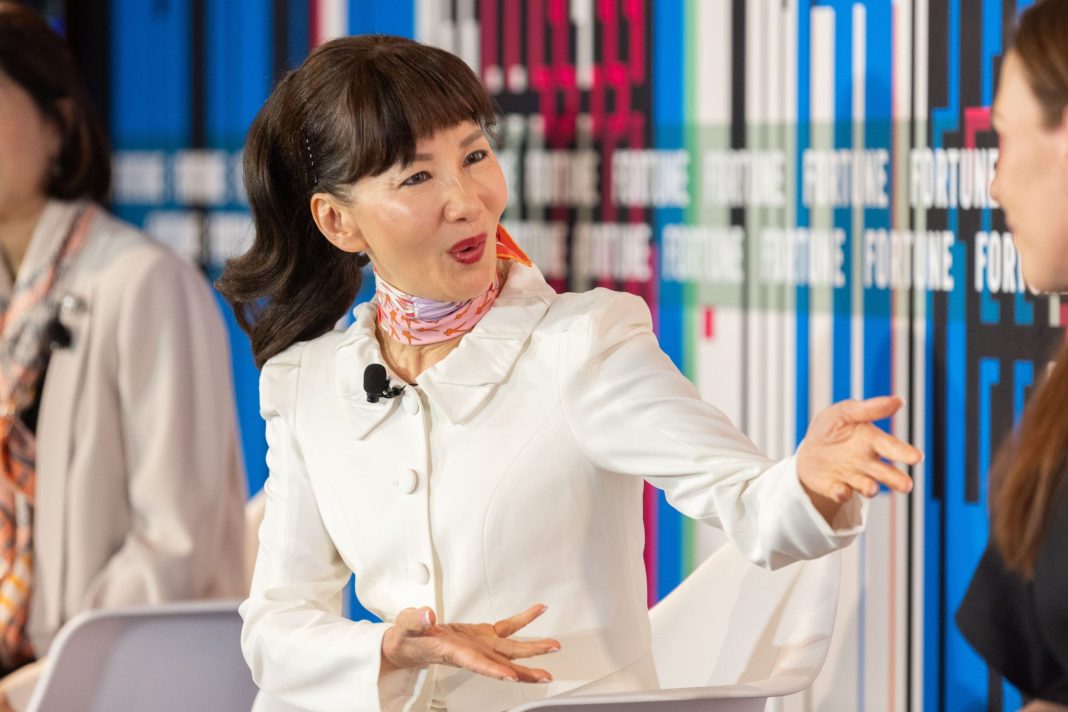Jane Sun, one of the few female CEOs in the male-dominated world of China Big Tech, feels a tremendous responsibility to pave the way for other women leaders. On Wednesday, at a Fortune Most Powerful Women event in Hong Kong, she reflected on how she first joined the Chinese travel platform company, Trip.com Group.
She had a young baby at time, and knew she needed to make a decision quickly, she said. The thought of working for a travel-focused company appealed to her–and took the job to reflect that passion. She was Trip’s CFO for the next seven years, before becoming COO in 2012 and CEO in 2016.
Sun spoke at a Most Powerful Women breakfast event at the Fortune Innovation Forum in Hong Kong on Wednesday morning, alongside three other women business leaders: Kathryn McClay, president and CEO of Walmart International; Bonnie Chan, CEO of Hong Kong Exchanges and Clearing; and Joey Wat, CEO of Yum China.
Women in CEO roles are trying to eliminate some of the barriers women face in balancing domestic workloads and their careers–with the demands at the home often squeezing women out of the workforce.
One of the most critical and most difficult periods for women in their career is when children are very young, Wat said on Wednesday. In addition to children, women are often expected to care for their parents and their husband’s parents. “I went through the same struggle,” she said.
China’s demographic struggles
China’s population dropped for the second straight year in 2023, dropping 0.15% to hit 1.409 billion, according to the country’s statistics bureau. The country’s birth rate also hit a record low, at 6.39 births per 1000 women.
Beijing has repealed family planning controls, like the famous “One Child Policy,” which restricted how many children a household could have. Local governments are also trying to offer childcare incentives to encourage parents to start families.
China is one of the most expensive places in the world to raise a child, according to the YuWa Institute, a Chinese think tank. It costs 6.3 times China’s per capita GDP to raise a child in the country to the age of 18, compared to a 4.11 ratio in the U.S.
Supporting parents in China
Both CEOs have prioritized policies that try to retain women in the workforce and give them more support when it comes to juggling life and work.
On Wednesday, Sun noted that Trip.com offers free taxi trips for pregnant employees to travel to and from work. The travel company then offers education stipends to new parents to help defray expenses.
More controversially, the company pays women employees to extract and freeze their eggs, one of the first tech companies to offer such a benefit. “It’s an option,” said Sun. “If you don’t like it, you don’t need to use it.” The company also gives children from ages of one to five a birthday gift equivalent to $1,400, she said.
More than half of Trip.com’s workforce, 40% of its middle managers, and a third of executives are women. Yet even with those figures, “I still think we can do better,” said Sun. “We’re working very hard to come up with a policy that empowers leadership.”
Wat shared similar figures about Yum China. She said the company has a workforce of 430,000 people and more than 50% are women; the Yum China board is made up of 40% women. One of the benefits Wat said has been most effective, even though it isn’t cheap, is allowing women to add their parents to their health insurance coverage. “A lot of women are responsible not only for their children but for their parents. It’s very challenging,” said Wat.
The Yum China CEO noted that covering an employee’s parents was an expensive, loss-making prospect for insurers. But given the sheer size of Yum’s workforce, the company has been able to self-fund the plan with contributions from labor and other employee groups, she said.
Given Yum China’s success in achieving gender diversity, Wat said the company can now focus on advancing both women and men and strategic benefits can help all employees. “When you include men and women you can build a better place [to work] and a better world,” said Wat.


